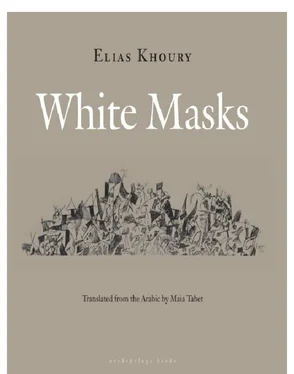Anyway, getting back to the point, Khalil Ahmad Jaber did not commit suicide: ergo, he was killed. But we don’t know who killed him. And if, to this day, we do not know who killed the political strongman and powerful leader, Kamal Jumblatt, 11how will we ever find out who killed Khalil Ahmad Jaber?
It wasn’t for lack of trying, either. I spent months investigating and reading to try and establish the facts. I must have smoked thousands of cigarettes sitting at my desk, with an aching back, trying to figure out what happened… to no effect.
So now, dear reader, you too may feel as bewildered as I do. Faced with the impossibility of discovering the truth, you must doubt, as I do, the reported incident itself, as well as people’s accounts. I’m sure one of those clever literary critics is going to say that I’m making a mountain out of a molehill. I can just hear him saying, but surely Beirut is just like any other city, full of ordinary people leading ordinary lives, going to work, eating, sleeping, having sex, having children, dying, celebrating festivals, buying chocolate eggs, sugared almonds, and maa’moul. While all of that is true, I don’t know how one can reconcile that assertion with my story.
If it weren’t for fear of being told that I have been blowing things out of proportion, and that I am full of doom and gloom, indeed that I invite misery — and that such a negative stance merely “serves the interests of the imperialists”-I might have told you the barber’s tale, or written the story “white masks .” But if I, who have witnessed all these events and lived through them, cannot believe my own eyes, how could anyone believe this story who hasn’t shared our experience of this beautiful city called Beirut? And I will no doubt be accused of exaggerating, of only seeing the tragic side of life, of being unable to behold the sweep of history, the importance of geography, etcetera, etcetera, etcetera. .
The truth is I now have to admit my mistake: I should have used a more serious incident as my point of departure. After all, how significant is the discovery of a corpse, especially that of an unremarkable man, just an ordinary citizen? And what does the phrase — an ordinary citizen — mean anyway, in light of the government’s “extraordinary powers” and the conduct of summary justice? It makes no sense whatsoever, and the critic is right. So, it’s a meaningless story, I admit it. Had I been looking for meaning, I should have taken a different tack and told the story of… Genghis Khan, for example.
However, if after all that’s happened to us, you expect me to tell that kind of story, you’re mistaken — as was I.
Had I been looking for meaning, I should have started differently. I should have told the story of the Palestinian man who was found dead in an airport restroom after committing suicide; or maybe the story of my friend, the doctor, Ajjaj Abu Suleiman, and his countless love affairs; or perhaps the story of our neighbor, Imm Mohammad, and how her husband died. Maybe if I tried again, I could lend some meaning to our story here, and bring it closer to the happy ending that we all secretly yearn for: the resolution that would shield us from the debilitating pessimism we all feel — isn’t that the whole point of a story?
As for the Palestinian who was found hanging in the airport restroom, well, that’s a very ordinary story really, with a straightforward narrative, and no stylistic flourishes whatsoever — no magic realism, flashbacks, or literary cadences. . It’s the simple story of a young man who realizes that he has lost everything and commits suicide. Just like the tailor.
But the tailor was rather more fortunate than the young man, because when he hurled himself into the sea, he at least was able to breathe in the fresh air and plunge into clean, salty seawater. Whereas the young man, let’s call him Moeen Abbas, committed suicide in the worst possible circumstances: in the stench of an airport toilet, amidst throngs of travelers and well-wishers milling around the halls, not to mention policemen, soldiers, immigration officials, and the mukhabarat. 12
The tailor committed suicide in far, far better circumstances, and one can feel fairly confident that he did not suffer the horrific pain Moeen Abbas went through. According to doctors, when the tailor flung himself over the edge of the road into the sea, he died instantaneously: his death occurred on impact, as his body was propelled onto the rocks in the shallows. Whereas Moeen Abbas must have suffered terrible pain — pain of a rather different sort than that of Ghassan Kanafani’s heroes who were left to die in the inferno of a bolted tanker truck under the sun. At least the characters of Men in the Sun were part of a group, while Moeen Abbas was all alone — and death shared with others must be easier to face than solitary death. However, the most significant difference is that the characters of Men in the Sun are heroes, or archetypes. Moeen Abbas was neither: he was just an “ordinary” young man who committed suicide in an airport toilet. And the terrible pain he suffered was due to the fact that he hanged himself by his leather belt, which he hadn’t lubricated with soap or any other type of grease, the way executioners do with the noose to ease the hanging victim’s pain.
Moeen Abbas was a medical student at Cairo University. His parents and relatives all live in Gaza City, which has been occupied by the Israeli army since the June 1967 war. As they were extremely poor, Moeen Abbas had to make do with a small scholarship he was awarded by the Egyptian government as an honors student.
Moeen Abbas led a very ordinary — not to say substandard — life in Cairo. He studied hard but yearned to finish up and return to Gaza to work and settle down.
He was not particularly politicized, beyond simply being a Palestinian: you can’t be Palestinian and not be involved in some form of politics or other. That is to say, he took part in whatever student events were held at the university, put up posters when necessary, and distributed books and pamphlets about the Palestinian cause.
In Cairo, Moeen Abbas began feeling increasingly conflicted: after years of dreaming about her, he found he wished to forget his young cousin, Sana’, to whom he had promised marriage, and whom everyone in the refugee camp knew was destined to be his wife. He was very proud of Sana’ and of her stunning looks. But now in Cairo there was Mona, a fellow student.
Moeen Abbas had never felt like this before. He was in love and it felt like a huge dam had burst inside him. Mona would talk to him about her studies, about the movies she went to see, about her sadness at the death of Abdel Halim Hafez — she said singing was “finished” now that he had died. But as this subterranean river swept Moeen up, Sana’ was nowhere to be found in it. What would he say to her, how could he tell her about all this?
Moeen went out with Mona, the black-haired Egyptian beauty. He waited for her and wrote to her… One day he found himself scribbling on a piece of paper something that resembled poetry. He tore it up. I’m a doctor, he thought, not a poet. Poetry isn’t for me.
Yet, here he was living with this ever-expanding wellspring inside him. Mona by his side everywhere: in the lecture room, in the dissecting lab, with her laughter and the dimples dancing in her elongated face. She was the daring one too. It was Mona who urged him on; he didn’t want to do it. He always told himself that he wouldn’t have sex with the woman he loved until after marriage — because sex is sacred. He’d always felt sickened by the sight of those naked, or half-clad Israeli girls who roamed the beaches in Gaza and fully agreed when his grandfather fulminated about that kind of conduct being contrary to “our customs.”
Читать дальше












